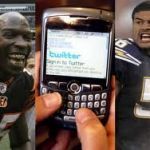Athletes Can Drop the Ball When Using Social Media

Many of us who follow the sports world have read or heard about some of the Twitter gaffes that professional or collegiate athletes have made in the last few years.
Mistakes, in fact, that have led to crack downs by teams or schools, who in many instances now warn athletes that their actions are being monitored and taken seriously.
Among some of the notable messages (tweets worded as they went out over the Internet):
Steve Johnson Buffalo Bills wide receiver blames God for game winning dropped pass – "I PRAISE YOU 24/7!!!!!! AND THIS HOW YOU DO ME!!!!! YOU EXPECT ME TO LEARN FROM THIS??? HOW???!!! ILL NEVER FORGET THIS!! EVER!!! THX THO…"
San Diego Charger's Antonio Cromartie's Food Tweet – "Man we have 2 have the most nasty food of any team. Damn can we upgrade 4 str8 years
the same ish maybe that's y we can't we the SB we need."
Marlon Williams of Texas Tech Tweeting about his coach being late – "Wondering why I'm still in this meeting room when the head coach can't even be on time to his on meeting."
While none of those tweets were offensive as far as any racial slurs etc. against any individuals or groups, they did not win any favors either from their employers or college officials.
Think Before You Type
For athletes using sites like Twitter, it allows them to be closer to their fans and fellow athletes as they share details regarding their personal lives. Going viral, however, does have its shortcomings, especially when a tweet is perceived as a slam against an individual or group.
Former Kansas City Chiefs running back Larry Johnson was hit a while back with a two-week suspension after using an anti-gay slur on his Twitter account. In light of that, Johnson switched his account over to private, meaning individuals had to gain his approval before being allowed to read his posts.
That being said, some athletes are actually tweeting up a storm on Twitter, with New England Patriots and former Cincinnati Bengals wide receiver Chad Ochocinco tweeting on average more than eight times each hour.
In order to make for better experiences on sites like Twitter, some professional and collegiate teams have hired social media consultants to work with athletes, meaning that what they're saying online will not come back to haunt them or their organizations/schools.
The bottom line is that athletes who take to tweeting need to remember that those messages can become viral time bombs in such a short period of time.
Even if there is an apology to a message they made, the athlete can suffer repercussions for some time to come. Among those problems can be suspensions, fines and loss of pricey endorsements.
As social media continues to evolve, and as athletes continue to want to express their feelings about their games, careers and life in general, those who employ such individuals (while athletes are not technically employed by colleges, they do represent the schools) will likely be monitoring what they say.
Remember, it just takes one tweet, Facebook share or other electronic communication for an athlete to drop the ball.
[image error]



